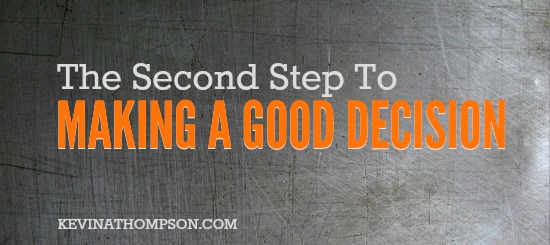Some decisions matter more than others. (For the first step in decision making, see: Stop Freaking Out)
Few, if any, remember what they had for lunch five years ago today, but every person can distinctly remember their wedding day, no matter how many wedding days they have had. I regularly tell couples at a wedding, “For better or worse, this will be a day you never forget.” Getting married is always an important decision. Where you shop, what you eat, and how you spend some free time is generally not that vital.
Since some decisions matter more than others, the effort we put into making decisions should not be the same for every issue. Some choices deserve more time and effort than others.
One of the first things we have to determine regarding a decision is the context of the choice before us.
Determining the context and consequences of a decision reveal how much time and energy should be spent in the decision-making process. If the consequences of the decision are not extreme, little time needs to be spent on a decision. However, if the wrong choice could be disastrous, we must take adequate time to make the best decision possible.
Understanding the context of the decision determines nearly everything. (See: Dr. Seuss Said You Are Bad at Decision Making)
The context of a decision can be determined by asking five questions:
1. Is this my decision to make? Every Fortune 500 Board, non-profit board, leader, and person should begin every discussion with this question—is this our decision to make? Many times the answer is no. Even as a leader or parent, while the buck might stop with us, we must empower employees or children to make decisions. The fewer decisions we make, the better. And many decisions we fret over aren’t even our decisions to make in the first place. Before spending any time on a decision, ask if this is my decision to make.
2. How important is the issue? Nick Saban eats the same thing for breakfast and lunch every day—Oatmeal Cream Pies for breakfast and a salad for lunch. Do you know why? He doesn’t want to waste time debating what to eat. He knows he has to eat; he knows it doesn’t greatly matter what he eats (although his doctor might disagree with this breakfast); so why waste time thinking about what doesn’t matter when he can use that time thinking about things that do. If the issue isn’t of great importance, don’t spend a tremendous amount of time on the issue. Decide and move on. (See: What to do Right When You’ve Already Done Wrong)
3. How difficult is making a wise choice? Some decisions are harder than others. Many are difficult for everyone, but some are easy for certain people and harder for others. We must understand how difficult it will be for us to make a wise choice. Do I have a history of making bad choices in this area? If so, I need to get help. Is this an area in which many friends and colleagues have struggled? If so, I need to be careful. If a wise choice can be made easily, I can quickly make a decision. If others have failed in this area, I might need to take more time.
4. Could my personal bias sabotage my decision-making process? Sometimes we are too close to a situation to think rationally about it. Surgeons aren’t allowed to operate on themselves or their loved ones because of a lack of objectivity. We must be very careful when making decisions because we are rarely objective. The more invested or involved we are with a situation, the more hesitant we should be in boldly making a decision in isolation. (See: Stop Listening to Your Heart)
5. What could be the lasting consequences of the decision? The longer lasting the potential consequences, the more time and effort that should be given to the decision-making process. Hiring an employee should take more time than choosing a copier because the potential consequences are greater. If today’s decision will matter ten years from now, it should get more focus than a decision that won’t matter ten months from now.
Every decision is not equal. Some matter more than others. Identifying the most important decisions and spending the appropriate amount of time on those decisions can be the difference between success and failure.



